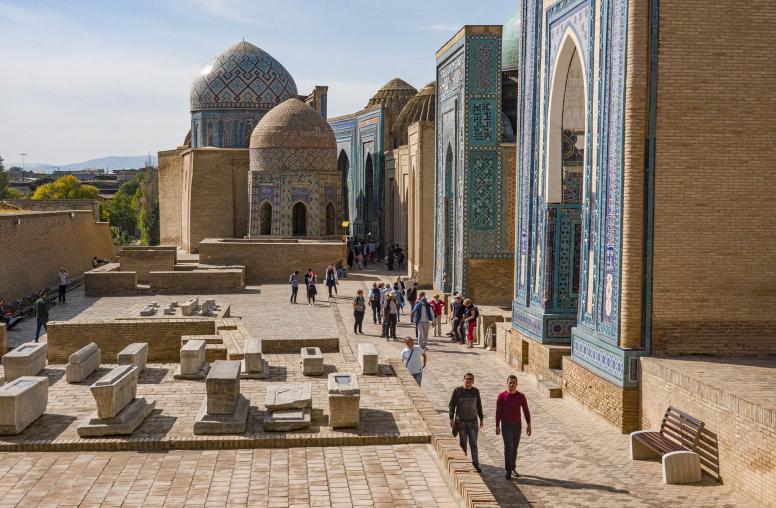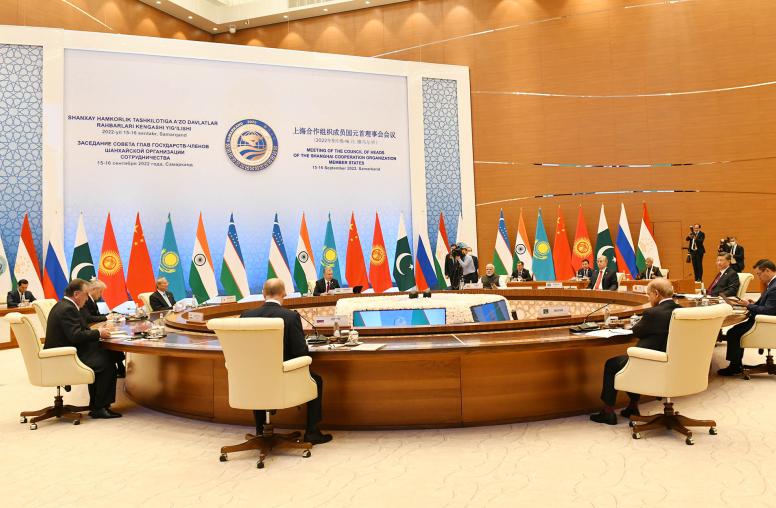Gavin Helf on the Aftermath of Kazakhstan’s Unrest
Kazakhstan has stabilized after protests broke out to start the new year. USIP’s Gavin Helf says while the sudden unrest was driven by “real, honest-to-goodness protests … what we really saw was the weakness of authoritarian systems,” as loyalists of the previous and current leaders clashed amid the public upheaval.
U.S. Institute of Peace experts discuss the latest foreign policy issues from around the world in On Peace, a brief weekly collaboration with SiriusXM's POTUS Channel 124.
Transcript
Julie Mason: It's time to catch up with Kazakhstan. Gavin Helf is senior expert on Central Asia at the U.S. Institute of Peace. He works on Kazakhstan, Kyrgyzstan, and Tajikistan, also Turkmenistan and Uzbekistan. Wow, Gavin, all the garden spots. That's amazing.
Gavin Helf: Oh yeah, all the "stans."
Julie Mason: I “stan” that part of the world. Let's get up to speed on Kazakhstan. What is the status there right now?
Gavin Helf: Things have settled down. The Russian troops and CSTO troops that were brought in during the crisis have all gone home. Things are quiet in the streets. There are a lot of people who are still under arrest, and they're still trying to sort everything out, but it looks like the situation has really been stabilized. For now.
Julie Mason: And politically, what's the "sitch"?
Gavin Helf: So, the situation is, you know, what I think we really saw here was a combination of real honest-to-goodness protests. People were fed up with corruption, they were fed up with a real inequity and how the oil wealth was distributed across the population. And the proximate reason this happened was they raised the price of propane in the middle of winter, which was probably a bad idea. So, there was a real protest. But what really happened was the former president, Nazarbayev, the old guy who's been trying to hand off power to a chosen successor Tokayev, that really broke down. I think what we really saw there was the weakness of authoritarian systems. They can't get from one president and his family, and his oligarchy, to the next president very safely. It's a real weak spot for all of these countries.
Julie Mason: I mean, that's just one of their many issues, yeah. So, it started out as a protest against fuel prices, and then sort of mushroomed into something else. And the people seem a bit fearful there of protesting again.
Gavin Helf: Well, we're going to see more protests and these things happen. Usually, they're a little bit more focused and local, and the regime, the Nazarbayev government and the Tokayev government, over the years has been very good at, you know, they've got a playbook for dealing with these, right? Okay, so somebody raised the price of propane and people are in the streets. Let's lower the price of propane, let's have a tax holiday, let's try to buy people off. And these protests really did start out as the kind that the government was going to try to buy off, and then they got out of control. And it didn't really work. So, we're going to see protests again. I imagine that we'll probably see more of the government trying to work its way out of that and buy it off without using violence. The reason that the violence took place here was because parts of the government that were loyal to the old president fought against parts of the government that were loyal to the new president. So, it wasn't really the game plan that they usually would want to use.
Julie Mason: And what was the Russia piece of this?
Gavin Helf: Well, you know, Russia, I think it was a very limited engagement. They came in, they guarded the airport and some electric stations and stuff like that. I think what it really was was Putin putting his finger on the scales and tipping it on the side of Tokayev, the president, as a signal to everybody else in this in the system that no, you're not going to be able to topple the government, this isn't going to happen. Putin's got your back. I think people were a little afraid that this was Russia coming in to rebuild the Soviet Union or reassert its sovereignty over part of a country that used to be part of the Soviet Union. But, I think, really, you have to look at Russia a little bit more broadly. They're very busy right now in Ukraine. They've got a real bandwidth problem. They've got a lot of stuff on their plate. So I think this was sort of a very limited defensive move.
And one really important thing to remember about Russia is, Russia's foreign policy can be different in different places. So they're very aggressive and hostile in Ukraine, they're always kind of stirring the pot and keeping a turn going in the Caucasus, and they're actually more or less forced for stability in Central Asia. And they can do that all at the same time. So, I think that the real story here was, this was a breakdown of elite politics, and Putin sort of voted with his soldiers to come in and tip the scale.
Julie Mason: And what about the U.S.?
Gavin Helf: You know, the U.S. is never, and never has been, a big player in this part of the world. Obviously, it's, you know, right between Russia and China. So, we're not really the major player and probably never will be. And that's probably even more so true since August, when we pulled our troops out of Afghanistan, and sort of stopped having an immediate interest in the region. I think our real goal should be trying to figure out how to move Tokayev in the direction of opening up the regime, of political reforms, as opposed to oppression of these things.
He's come out and said some really great things about if we don't address the underlying grievances, economic grievances and political grievances that the people have, we're going to be back into a situation with protests again. So, he's saying the right things. I think we ought to really figure out how to give him a chance to do the right thing and support him if he's moving towards reform because Russia and China will certainly be willing to support him with the suppression side of things. We hopefully don't want that to happen.
Julie Mason: Gavin Helf is senior expert on Central Asia at the U.S. Institute of Peace. Gavin, thank you so much for joining me this morning.
Gavin Helf: Great, great to join you. Bye.
Julie Mason: Take care.



